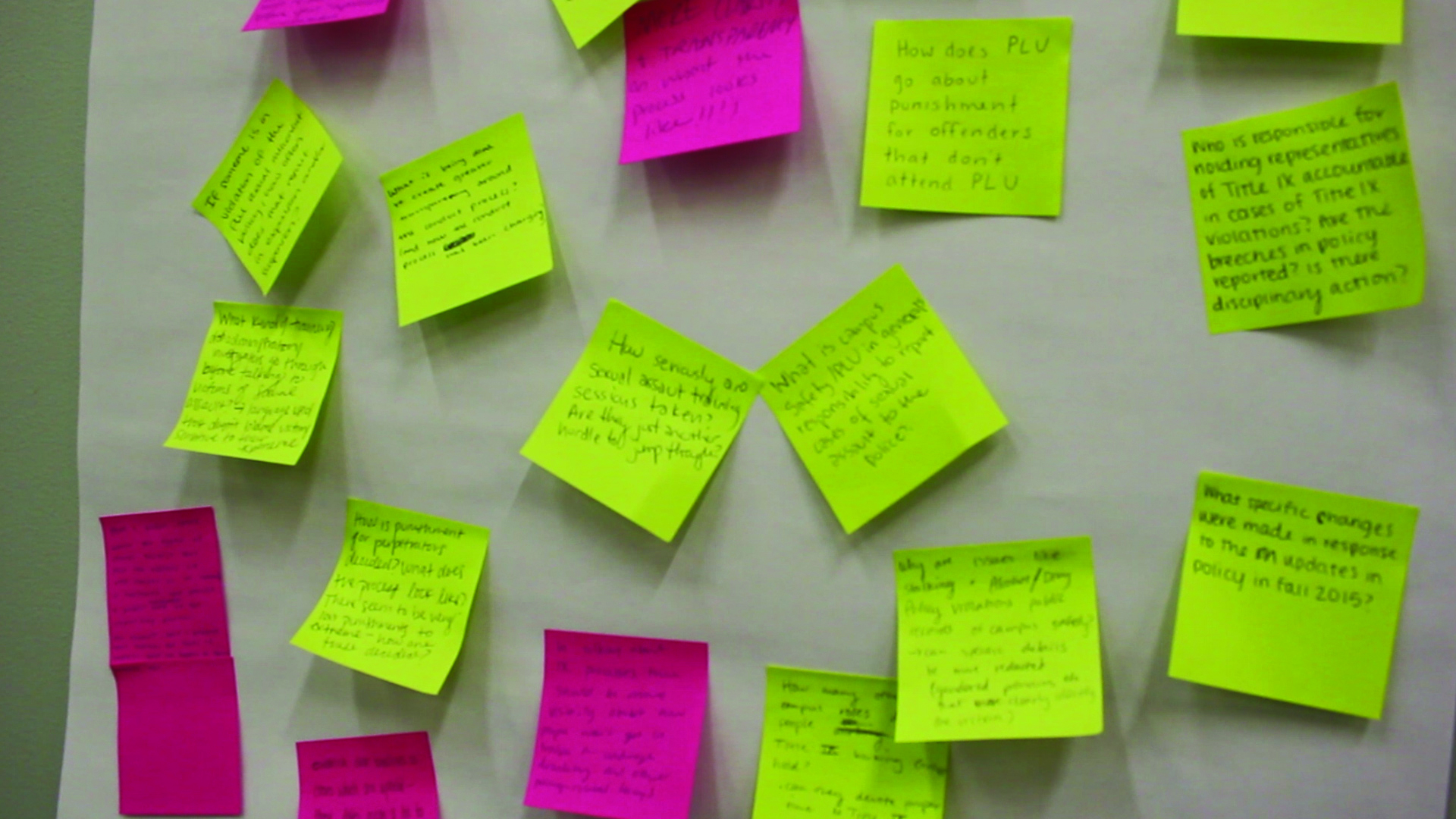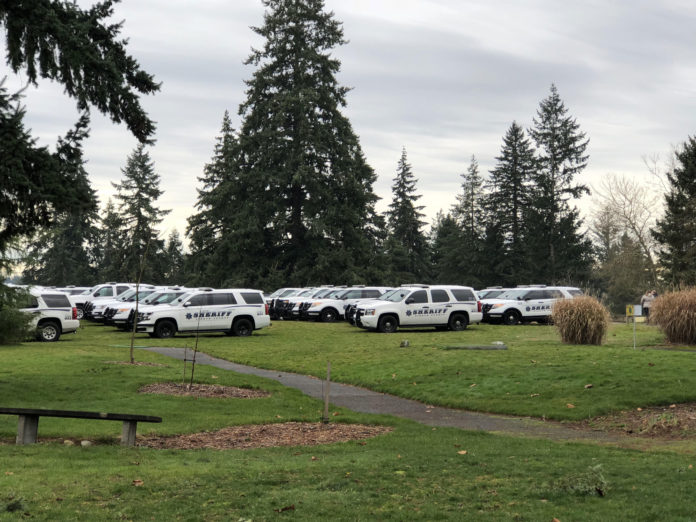
Rizelle Rosales; Mast Magazine Editor; rosalera@plu.edu
*Editor’s Note: This name has been changed to protect the confidentiality of this student.
Thousands of law enforcement officials and community members gathered at Pacific Lutheran University Jan. 17 to honor the life of fallen deputy Daniel McCartney.
McCartney was fatally shot on duty responding to a local burglary earlier in January. The memorial was held in Olson Auditorium after a procession through Tacoma from Joint Base Lewis-McChord to PLU.
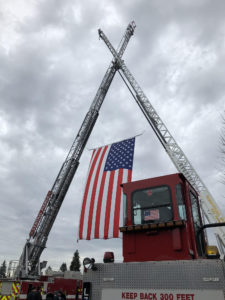
Flag hung in honor of fallen Deputy Daniel McCartey
The memorial brought more than 1,500 law enforcement personnel to campus, according to the Seattle Times. Parking lots across campus were affected by the influx of vehicles. An email sent by the Office of the President on Jan. 12 requested students to relocate and informed of restricted access to lower campus parking lots.
The email asked students and faculty to be prepared to show PLU identification to officers stationed across upper and lower campus. Though these precautions were taken with safety in mind, there was little preparation for the impact police presence would have on the campus community.
“The reactions from students are as varied as the students themselves,” said PLU Dean of Inclusive Excellence Jennifer Smith. “Even within each of those various reactions, there’s a diversity within them.”
For many, the memorial reflected PLU’s commitment to community by honoring the life of a fallen police officer. “It was a very proud moment for everybody involved. Just to honor one person, it was great to see a whole community,” junior transfer student Blair Berry said.
Along with involvement in the Reserve Officers’ Training Corps, Berry is part of the Active Duty Option Program, which allows him to pursue education while receiving commission. He has been deployed twice in his military career, and he is no stranger to the solemn traditions of a memorial service. From hanging the American flag to performing the Last Call, every piece of the service is revered as part of a long history of law enforcement traditions.
“Maybe you’ve never touched hands with the person, [but at a memorial service] you’re living their life right before your eyes. That’s the honorable piece you get to see and feel,” said Berry.
Through a military lens, public service memorials can bring back emotionally complex memories and past experiences. Professions in military and law enforcement often require a high capacity for emotional and psychological stress. However, professionals are not immune to the trauma that accompanies these experiences.
“The confidence in the way you display yourself at work is different than when you’re at home. There’s tons of emotional labor that is so demanding, you have to process it daily,” Berry said. This memorial “is an honorable thing and I want to be a part of it… but when I go to it, I’m reliving experiences I don’t want to relive.”
Berry was not alone in this experience. For others, the symbol of law enforcement does not represent safety. It poses a threat.
Junior Alesia Silva* is a member of the Gold Group, the anonymous support group for undocumented students at PLU. After the email from the Office of the President was sent out, she received an additional email from the Gold Group warning students that Border Patrol from the United States-Canada border in Blaine would be present on campus.
“If I wasn’t part of the Gold Group, I wouldn’t have found out about this at all. I find it infuriating that the school didn’t address it either,” said Silva. She remembered passing by several law enforcement officers on the way to class. Though she knew PLU had several policies in place that could protect her from detainment, she explained that she still dealt with internal frustration and fear.
When the Trump administration moved to end the Deferred Action for Childhood Arrivals Act last fall, this threatened the protection from deportation the act provided for undocumented students and professionals across the country. PLU promoted messages in solidarity with undocumented students.
Silva noted that inviting law enforcement to campus contradicted that sentiment. “It’s confusing,” she said. “You don’t really know where the university stands.”
Cennady Coleman, a first-year transfer from Howard University, came to PLU at the beginning to J-Term. They established their voice as an advocate for intersectional equity in their first few weeks, finding community in PLU’s Black Student Union, the J-Term Book Group and the collective.
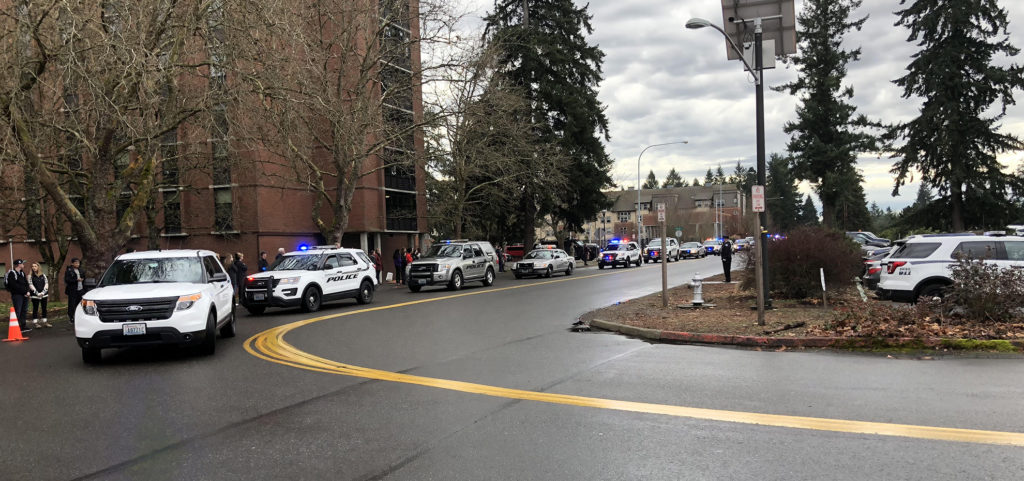
However, being on campus during the memorial impacted their impression of PLU’s values. “This is where I’m supposed to feel safe, this is where I’m supposed to be able to be in genuine and honest community with people, this is where I’m supposed to learn and grow. Now, I’m being intimidated by police,” Coleman said. “This doesn’t create a culture or a school climate that I want to be at.”
Coleman began their activism work in the summer of 2016, motivated by the deaths of Alton Sterling and Philando Castile, who were shot and killed by police. “These people who look just like my dad, some of my family members and people who I see myself in…they’re dead,” Coleman stated.
Coping with emotions of anger and fear, Coleman said they had to speak to their professor before class to explain that this presence was affecting their ability to fully be present in the classroom the day of the service.
“It was hard and frustrating, but I also [have] hope,” Coleman said. “[This] made me think about my own resilience too.”
The Office of the President sent a follow-up email Jan. 19 after recognizing the emotional impact on the campus community. “We recognize this was not PLU care at its fullest,” the email stated.
“We quickly realized that we needed to hear directly from students about their experiences,” said Smith. In her new position, Smith collaborates with Assistant Vice President of Diversity, Justice and Sustainability Angie Hambrick to manage climate and culture on campus.
Smith collaborated with Vice President of Student Life Joanna Royce-Davis and Associate Vice President of Marketing and Communications Lace Smith to create the Officer Memorial Debrief and Reflection event Jan. 31 in the Kriedler Lounge. The event saw approximately 25 people in attendance. Students, faculty and staff were able to write down their stories and share feedback.
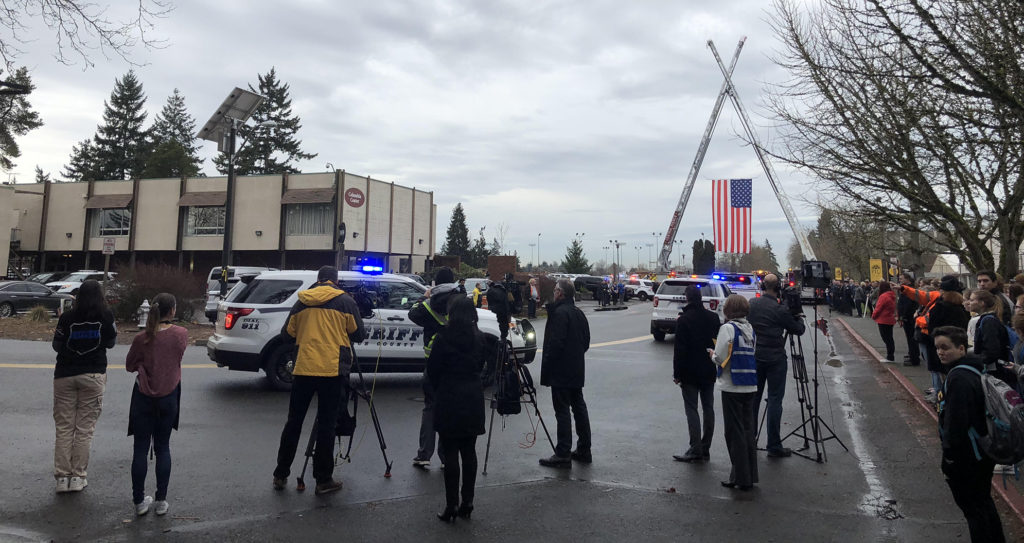
“The conversation was really helpful to think through the complexity of the issue [and] to think more inclusively about the variety of experiences our students have,” Smith recalled. “Holding that process of mutual care, concern and understanding is what I hope to work on moving forward.”
Smith and Hambrick intend to share these stories and ideas with the President’s Council in April. Smith also plans to create a platform so students can continue to submit their experiences in writing.
The team also endeavors to organize a representative student advisory board that can inform their decisions further down the road.
“What I hope [what] we can achieve at some point is just being able to hold all the reactions together as part of the community. The positive impact, negative impact, all the variety of impacts in between—that we hold them simultaneously,” Smith said. “We’re a complex batch of people here at PLU, but that’s part of the richness of our community.”

















